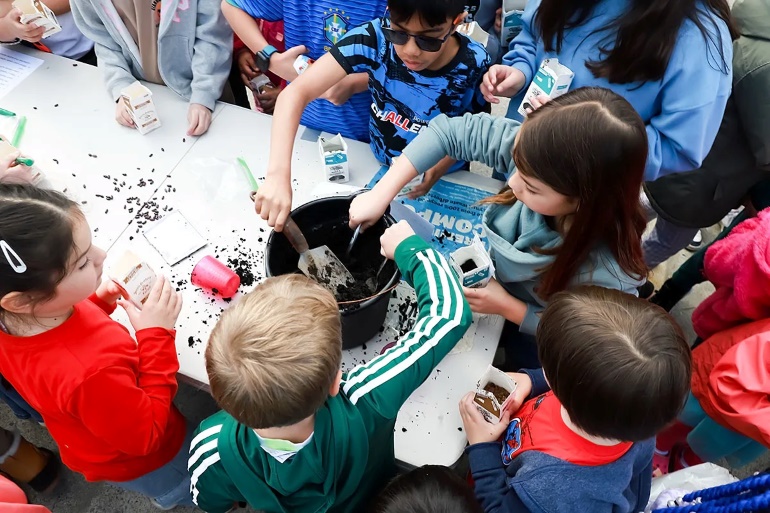Organics collection
Food scraps, partially eaten, and unwanted food that can't be donated can be collected for composting. A new law starting on January 1, 2025 will require schools to compost food waste if they create more than 1 cubic yard per week. That's about the size of a refrigerator. The Green Schools Program provides guidance, indoor collection bins, signs, and educational tools. Contact your program representative to learn more about how your school may be impacted by the Organics Management Law.
Criteria for recognition
Schools
- Establish and maintain organics collection and sustain low or no contamination in the organics bins for at least 3 months.
- Create a system to monitor contamination in organics bins. Collect data over time (at least 2 weeks) to see how effective your system is. Share results with your program representative. Conduct a baseline Waste Walk Through (WWT) at least every 2 years. Use the information to set organics collection goals.
- Share organics collection goals with the rest of the school. Examples could include assemblies, newsletters, announcements, or social media posts.
- Provide labeled organics collection bins paired with a trash can in kitchens, cafeterias, or areas where food is prepared or consumed. See our resources below for examples of bins and labels.
- Share your organics collection efforts and progress with your program representative
Districts
Districts can find recognition criteria for the Organics Collection Benchmark in the District Benchmark Guide.
Recognition form
Schools
Fill out the School Organics Collection recognition form. You may fill out the form to receive your benchmark badge at any time of year. Contact your program representative if you need assistance filling out the form.
You can complete the recognition form over multiple sessions using the "Save" button. You will be emailed a link that allows you to continue filling out the form. Once the form is complete, select the "Submit" button.
Check out all the schools that were recognized for Organics Collection in 2024-25.
Districts
Fill out the District Organics Collection recognition form. Districts may fill out the form to receive the benchmark badge in the spring of each school year.
Organics collection resources and activities
- Guide to setting up food waste collection
- Organics Management Law
- Information for setting up on-site compost
- Sample messaging to ask for parent volunteers
- Sample compost collection announcements
- Compostable service ware accepted by Cedar Grove
- Options for organic waste and garbage signs and stickers
- Options for organic waste bins
Interested in learning more? Check out our resource list for more detailed information on this benchmark topic.
Success stories
Pacific Cascade Middle School in Issaquah School District also initiated school composting at both A and B lunches. Their goal was to educate the student population on why and how to compost food waste. To do this, the Green Team made posters for the hallways and created Kahoot games to play in homeroom to teach students what goes in the organics bin. Over 50 students volunteered to monitor lunch cleanup and teach others how to sort. The school estimates that they saved an average of 77lbs of food waste from going into the landfill every single day.
John Muir Elementary School in Lake Washington School District started collecting food scraps from their cafeteria this year! They made a PowerPoint presentation to provide education to students and staff about how to go through the lunch waste food sorting line. They organized monthly trainings with student volunteers from 3rd, 4th, and 5th grades that monitored the food waste line at the three lunch periods. Students also learned that their food scraps from the cafeteria will be made into compost. At our Earth Day seed planting event, the students used Cedar Grove compost and saw first-hand what their food waste would become.

 Translate
Translate